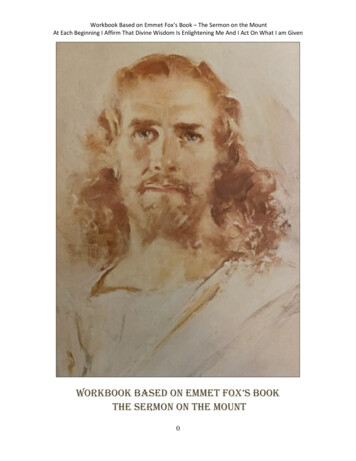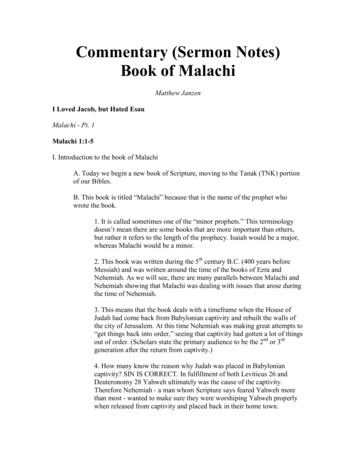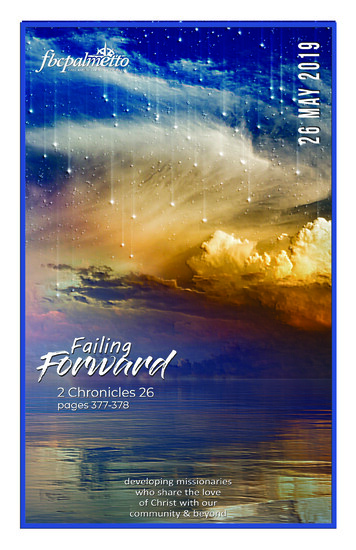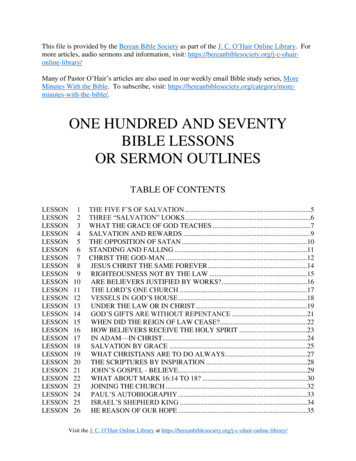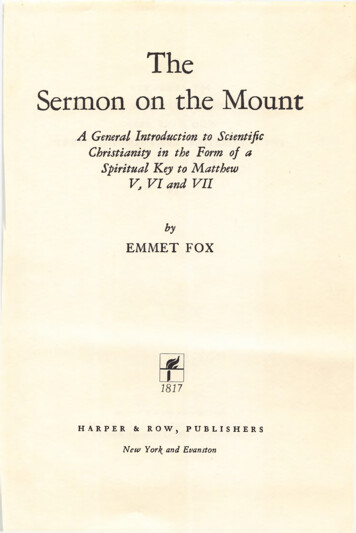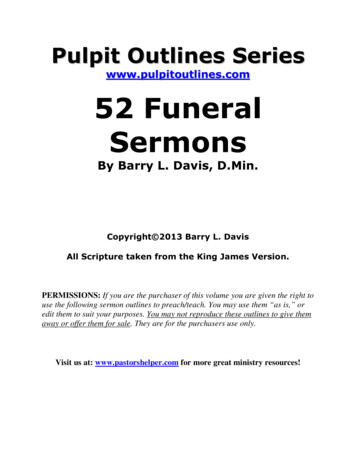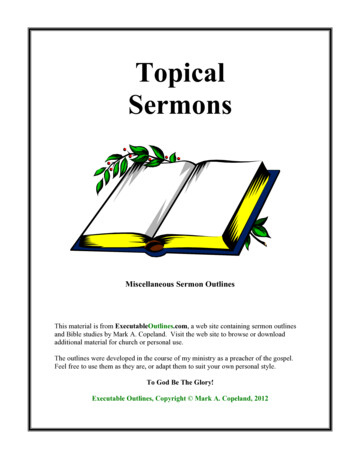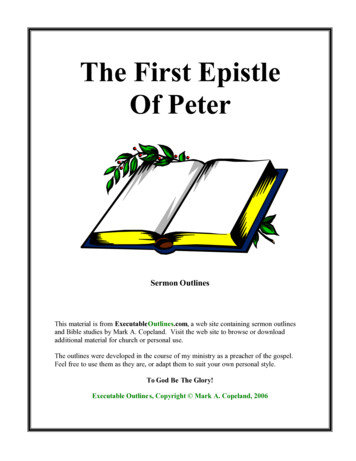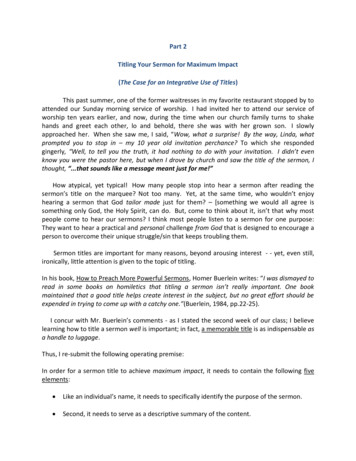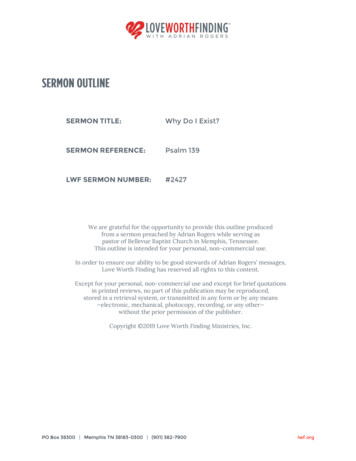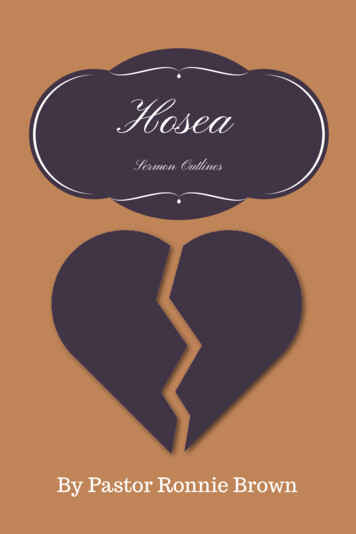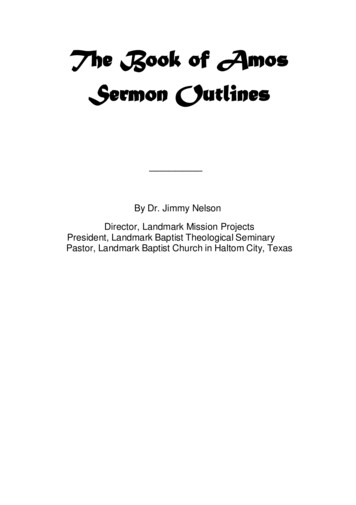
Transcription
The Book of AmosSermon OutlinesBy Dr. Jimmy NelsonDirector, Landmark Mission ProjectsPresident, Landmark Baptist Theological SeminaryPastor, Landmark Baptist Church in Haltom City, Texas
THE BOOK OF AMOS SERMON OUTLINESCopyright 2015 by (Dr. Jimmy Nelson, Landmark Publishing)All rights reserved. No part of this book may be reproduced ortransmitted in any form or by any means without written permissionfrom the author.Printed in USA by Grace Baptist Church Florence Printingoutreach )3
PurposeThose who labor in the ministry understand howhard it is to find the hours necessary to preparefresh material for three or more sermons eachweek. These outlines were prepared and preachedby the author and are being published in hopes ofhelping fellow labors to effectively prepare andpreach the precious Word of God to their owncongregation.The author does not claim originality to allmaterials and graciously acknowledges those whospent many hours searching the Scriptures andother scholars to compile the commentaries andwriting these outlines were gleaned from.It is the author’s sincere desire that the material inthis book will help you and glorify the Lord.4
IntroductionThe Book of Amos was written in a time when thepeople of Israel have reached a low point in theirdevotion to Jehovah, the God of Israel. The peoplehave become greedy and have stopped followingbiblical values. The wealthy elite are becoming richat the expense of others.God speaks to Amos, a herdsman, and tells himto go to Samaria, the capital of the Northernkingdom and deliver His message to the people.Through the prophet Amos, God tells the peoplethat he is going to judge Israel for its sins. He alsotells them that the judgment will come throughanother nation.The people understand the judgment to be thecoming of "the Day of the LORD." "The Day of theLORD" was an event that was highly anticipated bythe followers of God. However, Amos tells thepeople that "the Day of the LORD" was comingsoon and that it meant divine judgment for theiriniquity.Amos is the first prophet to use the term "the Dayof the LORD". This is an important phrase in futureprophetic and apocalyptic writing. For the people ofIsrael "the day of the LORD" is the day when Godwill fight against his and their enemies, and it will bea day of victory for Israel.However, Amos and other prophets include Israelas an enemy of God, as Israel is guilty of injusticetoward the innocent, poor, and young women. ToAmos "the day of the lord" will be a day of doom.5
The Book of AmosLesson 1Chapters 1:1 - 2:16Introduction (1:1-2)A. The Man – “Amos” means “burdenbearer.”B. Home - The village of Tekoa, 12 milessouth of Jerusalem, 18 miles west ofthe Dead Sea, In Judea, a veryrugged wilderness area.C. Occupation:1. A Herdsman (1:1) or shepherdand gatherer of sycamore fruit whowas called by God to prophecy 7:14-15.a. Herdsman (1:1, 7:14) istranslated sheep master in IIKings 3:4.b. Amos was not just a poorshepherd, but a landowner andbusinessman.2. Amos was accustomed to beingoutdoors and hard honest toil.6
3. Therefore, he had little sympathyfor the lazy, materialistic conductof his northern kinsman.D. Character1. Amos was known for his strongwill.2. His strong convictions, a sense ofjustice.3. And his stand for right and wrong.E. Education1. Amos had no formal education,but was greatly influenced by thePentateuch.2. He was not a member o the “sonsof the prophets”, and was neverofficially anointed a “prophet.” Buthe was called of God. (7:14).F. As a Prophet Amos was in manyrespects like the Lord Jesus Christ:1. In his occupation – he was aworking man (7:14).2. In his humility – he acknowledgedhis lowly origin (7:15).7
3. In his method of teaching – byillustrations.4. In his claim of Divine Inspiration –“Thus saith the Lord,” occurs 40times in his prophecy.5. In being charged with treason(7:10 cf. John 19:12).6. In the pressure of duty put uponhim – (3:8 cf. John 9:4).7. In denouncing the selfishness ofthe rich – (6:4-6 cf. Luke 12:1521).G. The Date:1. He prophesied in the days of:a. Uzziah, king of Judah.b. Jeroboam II of Israel.c. Two years before anearthquake.2. While the actual date is unknown,755 B.C. is the accepted date.H. The People:8
1. Although he was from Judah, Hisaudience was primarily thenorthern kingdom of Israel.2. The conditions that characterizedthose of the Northern Kingdom atthis time:a. They were wealthy, enjoyinggreat luxury.b. They were morally, religiously,and politically corrupt.I. Amos Message:1. Amos proclaimed God’s messageconcerning eight nations,especially the northern kingdom ofIsrael.2. In Amos 1:2, we see a vivid pictureof the Lord as a lion whose roarreaches all the way to Mt. Carmelin the North.3. This describes what God is doingthrough Amos - proclaiming a fierymessage of condemnation andjudgment against Israel and thesurrounding nations.4. The people of Israel were now atthe summit of worldly prosperity,9
but were rapidly filling up themeasure of their sins.5. The mission of Amos was,therefore, rather to threaten thanto console.a. He rebukes, among otherthings, the corruption of theirmanners, which kept pace withtheir prosperity.b. He charges the great men withpartiality as judges, andviolence towards the poor.c. He also foretells, as apunishment from God, thecaptivity of the ten tribes in aforeign country.d. Verse 2 is a good preview ofthe nature of Amos’ prophecy.J. Metaphors used in the book ofAmos:1. The straining of God’s mercycompared to the overloading of awagon – (2:13).2. The pressure of duty upon theprophet compared to the roaring ofa lion in his ears (3:8).10
3. The narrow escape of a remnantof Israel compared to a shepherdrecovering two legs or the piece ofan ear from a lion (3:12).4. The scarcity of God’s Wordcompared to a famine in thenatural world (8:11-12).K. The Divisions of the BookThe book of Amos is divided into threesections:1. A series of 8 “oracles”concerning sin and judgment ofeight nations (Chapter 1-2).2. A series of 3 “sermons”concerning the sin and judgmentof Israel (Chapter 3-6).3. A series of 6 “visions” regardingthe sin and judgment ofIsrael (Chapter 7-9).Now we will look at the first section of thebook of Amos - the “oracles” Amosproclaimed against eight nations.II. The “Oracles” of sin andjudgment upon the nations (1:32:16)11
A. Damascus - Amos 1:3-5.1. Sin - cruelty toward the inhabitantsof Gilead (the tribes of Gad andReuben).2. Judgment - destruction andcaptivity.a. Hazael was the murderer ofBen-Hadad I, and usurper ofhis throne - 2 Kings 8:7-15.b. Ben-Hadad II was the son ofHazel - cf. 2 Kings 13:3, 22-25.3. Fulfillment - by the Assyrians - Cf.2 Kings 16:1-9.B. Gaza (Philistia) - Amos 1:6-8.1. Sin - engaging in slave traffic.2. Judgment - total devastation.3. Fulfillment - by the Assyrians.C. Tyre - Amos 1:9-10.1. Sin - slave traffic; did notremember the covenantof “brotherhood” (betweenSolomon and Hiram? - cf. 1 Kings5:12.12
2. Judgment – destruction.3. Fulfillment - started byNebuchadnezzar; finished byAlexander the Great.D. Edom - Amos 1:11-12.1. Sin - cruelty to brethren - cf. Oba1:10-12.2. Judgment - destruction uponTeman (capital) and Bozrah(another chief city).3. Fulfillment - by the Nabateans,400 B.C.E. Ammon - Amos 1:13-15.1. Sin - murder of pregnant womenin Gilead (the tribes of Gad andReuben).2. Judgment - destruction of Rabbah(capital) and captivity.3. Fulfillment - by Nebuchadnezzar.F. Moab - Amos 2:1-3.1. Sin - burned the king of Edom’sbones.13
a. As an act of war theydisrespected and dishonoredthe tombs of the dead, andparticularly the bodies of thosethey conquered.b. In particular, the King had thebody of the King of Edombrought out of the tomb andburned.c. This judgment teaches Goddemands to respect the bodiesof the dead.d. It also teaches that we are togive the dead a proper burialand not cremate their bodies.e. The judgment speaks ofburning the body.Cremation disrespect and dishonor.2. Judgment - destruction of thechief city of Kerioth, and the deathof the King and princes.3. Fulfillment - by theNebuchadnezzar and theBabylonians five years after thedestruction of Jerusalem.Moab was never seen as a nation again.14
G. Judah - Amos 2:4-5.1. Sin - apostasy from the Law.a. Judah had rejected theteachings of the Lord by failingto keep His commandments inorder that they might honor HisName.b. The ‘lie” spoken of is theirleaving the pure worship ofGod to follow the idolatry,errors, and false worshiplearned from their ancestors.2. Judgment - Jerusalem (thecapital) to be destroyed.3. Fulfillment - by Nebuchadnezzar,586 B.C.H. Israel - Amos 2:6-161. Sin - several sins are listed.a. Social injustice.(1). Dishonest judges (bribes).(2). Resulting in the abuse ofthe poor.15
(3). Slave trade resulting fromthe abuse of powers byjudges and creditors.b. Religious Immorality(prostitution) brought into thereligious worship of Israel fromthe Canaanites.c. Idolatry (worshipping othergods) just as Judah.d. Ingratitude against God –There are four evidences aregiven:(1). Cast out the Amoritesbefore them.(2). Delivered them from theland of Egypt.(3). Gave them prophets (whotold them God’s will) andNazirites (who lived agodly example beforethem).(4). But the rich told theprophets to be silent anddemanded the Naziritesbreak their vowsconcerning strong drink.16
(5). The effect of whichweighed God down like acart full of sheaves - Amos2:13.2. Judgment – Verses 14-16, theirinability to flee when destructioncomes upon them.3. Fulfillment - by the Assyrians in722-721 B.C. - 2 Kings 17:5-23.Amos prophesied against Judah, Israel, andthe nations surrounding Israel, Noneescaped God’s judgment.III. Lessons Received From The“Oracles” Of Amos.A. God is sovereign and holds thenations of men accountable.1. He was not just concerned withHis covenant people of Israel.2. God judged the surroundingnations as well.One commentator says, “His whole messagecenters in the common prophetic convictionthat God is the sole and righteous Governorof the world, judging the people righteously,and when they rebel, dashing them to pieceslike a potter’s vessel.”17
Romans 9:21, “Hath not the potter powerover the clay, of the same lump to make onevessel unto honour, and another untodishonour?”3. The same authority is given toChrist today! - Cf. Mt 28:18; Re1:5; 2:26-27.B. Apostasy And Cruelty Treated Alike.1. God condemned:a. The heathens for their cruelty.b. Judah and Israel for theirapostasy from the Law andsocial injustices.2. Their judgments were basically thesame.C. The Standards To Which NationsWere Held Accountable.1. The heathen were judged for theirviolation of basic principles ofrighteousness.2. The people of God were judged bytheir faithfulness to God’s revealedWord!18
3. This is similar to Paul’s writing inRomans 2:12-15.Conclusions:Having read the judgments God pronouncedupon the eight nations.A. We are reminded that God is arighteous God.B. A Sovereign God who holds men andnations accountable for their actions.C. Are we ready for that great Day ofJudgment, in which we will oneday be held accountable for ouractions?Paul wrote in 2 Corinthians 5:10-11a,“For we must all appear before the judgmentseat of Christ, that each one may receive thethings done in the body, according to whathe has done, whether good or bad.Knowing, therefore, the terror of the Lord, wepersuade men.”Are you willing to let the Word of Godpersuade you to do what is right?19
The Book of AmosLesson 2Chapters 3:1 - 6:14Review:A. In chapters 1 and 2 we saw that Amoswas:1. A prophet of God, who was.a. A herdsman and gatherer ofsycamore fruit - Amos 7:14-15.b. Called to proclaim God’sjudgments on the nations,especially Israel.2. Whose book is divided into threesections:a. “Oracles” concerning sin andjudgment of eight nations(Chapters 1&2).b. “Sermons” concerning the sinand judgment of Israel(Chapters 3-6).c. “Visions” regarding the sin andjudgment of Israel (Chapters 79).20
3. In his “oracles”, we saw that Godpronounced judgment upon.a. Heathen nations, such asDamascus, Gaza, Tyre, Edom,Ammon, and Moab.b. The people of God, both Judahand Israel, with emphasisplaced upon the sins andjudgment of the northernkingdom of Israel.B. In this lesson, we shall study the“sermons” found in chapters 3-6.1. There are three sermons; eachbegins with “Hear this word.”Cf. 3:1; 4:1; 5:1.2. The focal point of these sermonsis Israel, especially the kingdom inthe north.I. The First Sermon – The Doom OfIsrael (3:1-15).A. Israel’s Unique Position:1. The Lord speaks to Israel –Verses 1 & 2.a. He reminds them of theirspecial relationship.21
b. He says that He will nowpunish their sins and judgmentbegins at the house of God.1 Peter 4:17, “For the time is come thatjudgment must begin at the house of God:and if it first begin at us, what shall the endbe of them that obey not the gospel of God?”(1). These judgments aretemporal not finaljudgments.(2). There is a call torepentance (5:14) eventhough Israel is deservingof judgment.(3). God has an elect remnant(9:9) that will be preservedby grace.B. Verses 3 through 6 contain sevenquestions with obvious answers:1. Can two walk together, exceptthey be agreed?No! To walk in fellowship there must beagreement.a. Amos was walking with Godand thus Israel should heed hisprophecy.22
b. Israel had forsaken the Lordand thus there was noagreement.3. Will a lion roar in the forest, whenhe hath no prey?C. Will a young lion cry out of his den, ifhe have taken nothing?1. The prophets warning is likened toa lions roar.2. It is a sure sign that impendingdanger is ahead.3. Because when the Lord speaksvia his prophet it is not an emptywarning.D. Can a bird fall in a snare upon theearth, where no gin is for him?E. Shall one take up a snare from theearth, and have taken nothing at all?There are two principles revealed in theseverses:1. First, Tragedy does not come bychance; it is God who is stretchingout his net of judgment.23
2. Secondly, Just as the fowler doesnot plan to return home emptyhanded, neither is God makingthese threats in vain.3. Therefore God will not withdrawthe Assyrians, the instruments ofpunishment, until they haveaccomplished God will againstIsrael.F. Shall a trumpet be blown in the city,and the people not be afraid?G. Shall there be evil in a city, and theLORD hath not done it?1. The words spoken by the prophetare likened to a warning trumpet.2. Normally when the watchmansounds the alarm, the people aresure to “run to and fro in alarm”(Hebrew, literally).3. Yet Israel is not alarmed, thoughGod threatens judgments.“Shall there be evil in a city, and the Lordhath not done it?”4. God is the Author of all thecalamities that come upon you,which are foretold by His prophets.24
5. The evil of sin is from ourselves;the evil of trouble is from God,whoever be the instrument may be.C. Can a prophet remain silent whenGod speaks? - Amos 3:7-8.1. The Lord does nothing unless Hereveals it by one of His prophets.2. Like a lion that has roared (Amos1:2), God has spoken and Amosmust prophesy!D. Israel’s Doom – Verses 11-15.1. The nations are called upon tohear the message of judgment andassemble themselves to see itsfulfillment that they mightunderstand that the judgmentswere due to Israel sin, which Godis now judging (Verses 9 & 10).2. God says that Israel is to bepillaged by an adversary (Verse11).3. Amos never identified theadversary; but Assyria fulfilled theprophecy within 50 years.4. The impending punishment:25
a. Only a remnant will survive ofthose who dwell in luxury, likea piece of lamb left over afterbeing ravaged by a lion.b. Destruction will come upon thealtars of Bethel (Jeroboam’sidolatry).c. Destruction will befall theirluxurious homes.5. With this first “sermon”, destructionis pronounced upon Israel.6. The sins of some of the men werementioned in Amos 2: 6-8, thenext “sermon” reveals thewickedness of the women.II. The Depravity of the Women ofIsrael (4:1-13).A. The “Kine of Bashan.” – Verse 1,“Bashan” was a very green and lush pasturearea just east of Jordan.“Kine” are cows.1. Amos calls them fat and lustfulcows.26
2. Not a polite way to addresswoman but especially degrading tothe duchesses and wealthysocialite women of Samaria.2. It was however a very fair and truerepresentation of these women,who were immersed in theindulgences of their animalappetites.a. Their only concern was for theirown contentment through foodand pleasure.b. Indirectly (through theirconstantly making of expensivedemands) caused theirhusbands to oppress the poorand needy.B. Crying out for wine – Verse 1This evil only increased their desiresof pleasure.H. Their punishment - Verses 2 & 3:1. They will be deported to aforeign land.2. “He will take you away withhooks.”27
a. Less than 50 years later thewomen we taken captive andforced to leave the city thoughbroken places in the wall.Their captors placed hooks intheir nose or lip and ropedthem together in a long train.b. The column of women, linkedby hooks and ropes wouldresemble a herd of cowsmaking their way through a gapin a broken fence.3. The causers of oppression arenow the oppressed.B. A Sarcastic Call to Worship.1. To worship their false gods atBethel and Gilgal - Amos 4:4-5.2. Designed to show how far theyhave departed from God.C. They Had Rejected God’sChastisements.1. Famine – Verse 6.2. Drought – Verses 7-8.3. Pestilence – Verse 9.28
4. Plagues and war – Verse 10.5. Earthquake, or volcanic eruptions– Verse 11 – possible those thathappened in the reign of Uzziahtwo years later.6. They had failed to repent andtherefore must prepare to meettheir God!a. Who is bringing suchjudgments upon them – Verse12?b. Verse 13 – The sovereignomnipotent, God of heavenand earth “The LORD, the Godof hosts” is bringing thesejudgments.I. In light of such a judgment to befallIsrael, it is not surprising to see thatthe third “sermon” is in the form of alamentation.III. A Lamentation for a Dead Nation(5:1-6:17)A. A Lamentation for the House of Israel.1. Her fall is imminent - Verses1-2.29
2. The Virgin Israel – never havingbeen subdued by an enemy isabout to fall.3. Verse 3 - only a remnant will beleft.B. A Call to Repentance – “Seek ye me,and ye shall live.”1. Those who would seek the Lord inrepentance would live, those whodid not would face his judgment!Verses 4-7.2. Seek Him who is all-powerful,creator and sovereign over allthings! – Verses 8-9.3. Amos tells them that The LORDknows their manifold sins. –Verses 10-13.4. Another call to repentance - seekgood, forsake evil and God will bewith you - Verses 14-15.C. The Coming Day of the Lord.1. The Lord is coming, and thereshall be wailing in the streets andfields – Verses 16-17.30
2. The day of the Lord is not to bedesired by sinful men.a. For it will be a day of darkness– Verses 18-20.b. For God is sickened by theiroutward show of religioninstead of true worship Verses 21-24.c. They never whole heartedlyworshipped God - Verses 25 d. Because they alwaysworshipped idols at the sametime – Verse 26.3. Therefore they will be taken into“captivity beyond Damascus.”(Assyria) Verse 27.D. A Warning to those in Zion – Amos6:1–7.1. Those living in luxury in Jerusalemfelt secure because they lived in awell fortified city and believed thatGod would not allow the temple tobe destroyed.2. The rich people in Samaria werealso at ease because they lived inwell fortified cities – Verses 1,2.31
a. Perhaps they believed thatthe northern kingdom would aidin their defense.b. Verse 2 reminds them of whathappened to kingdoms fargreater!3. Woe to those who say the day ofthe Lord is far off - Verses 3-6.4. Those who bask in their luxury,while their brethren are afflicted.4. They shall be among the first to gointo captivity - Verse 7.E. The Extent of the Coming Destruction.1. Destruction is coming becauseGod hates their pride – Verse 8.2. The destruction will be of men andtheir homes – Verses 9-11.3. Why? Because they perverted justiceand righteousness, priding themselves intheir own strength - Am 6:12-13.IV. Observations from the“Sermons” Of Amos.A. There is a recurring theme of justiceand righteousness.32
1. There are several references tojustice and righteousness. Amos5:7, 15, 24; 6:12.2. Their opposites “oppression” and“evil” are also mentioned in Amos3:10; 4:1; 5:10-12.3. Lacking justice and righteousness,all their religion, wealth, and powerwere in vain!There is a lesson for us in this.B. Israel’s Failure to Heed God’sChastisements.1. God used natural disasters to gettheir attention - Amos 4:6-11.2. Why did they not heed God’sefforts?3. They probably assumed that thedisasters were just coincidental.4. One would be amiss to alwaysattribute natural calamitiesto God’s judgment; although:a. We must be open to thepossibility that God maybe saying something?33
b. We should use such occasionsto examine our ownrelationship with God?C. Regarding the Day of the Lord.1. The “day of the Lord” is a day ofjudgment, and a day of darkness Amos 5:18.2. In Amos it has reference to God’sjudgment upon Israel, which camewhen Assyria took them intocaptivity.3. But such judgment prefigures theFinal Judgment, the “day of theLord.”(1). In which Christ will come tojudge the world - Ac 17:3031.(2). According to II Peter 3:7,10-12 that day will also bea day of “darkness.”D. God’s Gracious Offer of Repentance.1. With the pronouncement ofjudgment, there is an offer “Seekye me, and ye shall live.” - Amos5:4-6, 14, 15.34
2. God promises to forgive anyonethat would repent.3. Even today, while the gospelproclaims judgment to come, italso offer grace to repentantsinners - 2 Corinthians 6:1-2.Conclusion:A. According to 2 Kings 17:13-23, notmany heeded the warnings of Amos.1. Within thirty years (722 B.C.),Israel was taken into captivity.2. Under the cruel hand of theAssyrians, they experienced therighteous judgment of God.B. Many today are not willing to heed thewarnings of impending judgment.Our message is the same as Amos’swas, “seek the Lord and live.”C. Remember the book of Amos, alongwith the rest of the Old Testament,was: “written for our admonition, uponwhom the ends of the ages havecome.” (1 Corinthians 10:11).D. Are we willing to learn from itsadmonition?35
The Book of AmosLesson 3Chapters 7:1 - 9:15Introduction:A. The “Oracles” dealt with the sin andjudgment of eight nations (Chapter 12).B. The “Sermons” dealing with the sinand judgment of Israel (Chapter 3-6).C. This lesson deals with chapters 7-9.In these chapters there are:1. Five “Visions” (5 judgments and 1promise).a. The locust.b. Fire.c. The plumb line.d. The summer fruit.e. The smiting of the Temple.f. Restoration.2. An “interlude” in which Amosdefends his prophetic role.36
I. The “Visions” (7:1 - 9:15).A. The Vision of the Locusts (7:1-3).1. The vision and the Lord’sresponse to Amos’ intercession.a. The Lord shows Amos aswarm of locusts devastatingthe crops.b. Amos cries out in behalf ofJacob (Israel).c. The Lord heard the prayer ofthe prophet, and did notproceed with the threatenedjudgment of famine.The Lord stopped the judgment. Gill says,“He did not change his mind, but changedthe dispensations of his providenceaccording to his mind and will.”Dispensations - The method by which Godcarries out his purposes towards men.God unchangeably does what is just; it is justthat He should hear intercessory prayer(James 5:16-18), just as it would have beenjust for Him to let judgment take its course atonce on the guilty nation.2. The meaning of the vision.37
a. Most commentators take thelocust plague to be a figurativesymbol of the Assyrian armyinvading the land.b. Whether literal or figurative, thejudgment it represented isaverted through theintercession of the prophet.c. This vision depicts the allconsuming nature of god’swrath.B. The Vision of the Fire (7:4-6).1. The vision and the Lord’sresponse to Amos’ prayer.a. The Lord shows Amos a fireconsuming the “great deep”and the territory (drought thatwould naturally follow thedevastation by locust).b. Once again Amos cries out inbehalf of Jacob (Israel).c. The Lord again hears, anddoes not bring the judgmentupon Israel.2. The meaning of the vision.38
a. Clearly figurative, for the “greatdeep” is likelythe Mediterranean Sea.b. It figuratively speaks of themultitude of people, nations,and kingdoms, subdued by theAssyrians.E. The Vision Of The Plumb Line (7:7-9).1. The vision and the Lord’sexplanation.a. The Lord is standing on a wallwith a plumb line in hand.b. The Lord explains He is settinga plumb line in the midst ofIsrael, and will now bringdestruction upon:(1). The places of idolatrousworship (“high places” and”sanctuaries.”(2). The house of Jeroboam(the ruling king of Israel Amos 1:1).2. The meaning of the vision.39
a. A plumb line is used tomeasure the correctness ofany construction.b. God has so measured Israel,by the rule of his justice, andfound her so defective that Hemust bring forth judgment.c. The judgment will involvedestruction of her religious andpolitical leaders – Verse 9.D. An Interlude: Amaziah’s Complaintagainst Amos – Verses 10 -17.1. Amaziah, priest of Bethel (centerof idolatrous worship), accusesAmos of conspiracy againstJeroboam king of Israel. AmosVerses 10 -11.2. Verses 12-13, Amaziah tells Amosto leave the northern kingdom,return to his home and prophesythere.3. Why did Amaziah request theprophet to leave? Because theyprided themselves in their ownstrength – Verses 12-13.4. Amos’s response - Verse 14,15,40
“Then answered Amos, and said to Amaziah,I was no prophet, neither was I a prophet’sson; but I was an herdman, and a gatherer ofsycamore fruit: And the LORD took me as Ifollowed the flock, and the LORD said untome, Go, prophesy unto my people Israel.Now therefore hear thou the word of theLORD: Thou sayest, Prophesy not againstIsrael, and drop not thy word against thehouse of Isaac.”5. I did not ask for this job, but I mustbe obedient to the Lord who hassent me to prophecy.6. Verse 17 - The judgment of theLord:a. There wives would be forcedinto prostitution.b. Thy sons and thy daughtersshall fall by the sword thoushalt die in a polluted land andIsrael shall surely go intocaptivity.F. The Vision of the Summer Fruit (8:114).1. The vision and the Lord’sexplanation - Amos 8:1-3.41
a. Amos is shown a basket ofsummer ripe fruit.b. Just as ripe fruit must begathered at once, the Lordreveals that the end of Israel’sfruitful years has come andIsrael is ripe for immediatejudgment.2. Verses 4 –6 again describeIsrael’s sin:a. Oppression of the poor andneedy.b. Contempt for religiousobservances, because theyhinder economic enterprise.c. Dishonest economic practicesthat further abuse the poor andneedy.3. In verses 7-14, the nature ofIsrael’s judgment is described.b. A day of mourning is coming –Verses 7 –10.c. A day of famine for the Word ofGod - Verses 11-12.42
c. Verse 13, they will be leftwithout hope, having rejectedthe only source of power thatwould enable them to stand.d. Verse 14, discloses that thosewho trust in idolatry will fall andnever rise again.F. The Vision of the Lord standing on theAltar (Verses 1 - 10):1. Since the prophecy in general andthis vision in particular, deals onlywith the ten tribes, the altar uponwhich the Lord is standing seemsto be the one in Bethel and not thetemple in Jerusalem.Amos 7:13, “But prophesy not again anymore at Bethel: for it is the king’s chapel,and it is the king’s court.2. The altar shall be destroyed –Verse 1.a. “Smite the lintel of the door,that the posts may shake” – thesupport post will be destroyedand the entire buildingdestroyed.b. In the same manner in whichSamson:43
Judges 16:29, 30, “And Samson took hold ofthe two middle pillars upon which the housestood, and on which it was borne up, of theone with his right hand, and of the other withhis left. And Samson said, Let me die withthe Philistines. And he bowed himself with allhis might; and the house fell upon thelords, and upon all the people that weretherein. So the dead which he slew at hisdeath were more than they which he slew inhis life.”3. The Lord will judge those thatsacrifice there - Amos 9:1-4.4. No one escapes the judgment ofGod (Verses 1-4**.)5. The One who shall accomplish thisis described – Verses 5-6**.6. Israel has become little differentthan the heathen nations aroundthem – Verse 7.7. The careful, discriminate, nature ofthe Lord’s judgment – Verses 8 –10.a. The “kingdom” as a whole willbe utterly destroyed – Verse 8.b. The 10 tribes have neverexisted as a kingdom since44
their destruction by theAssyrians.c. But the “house of Jacob” willnot be completely destroyed –Verse 8b.d. But a remnant was sparedbecause of God’s covenantwith Jacob.e. Israel will be sifted like grain ina sieve:f. While Israel is being sifted, thechaff and dust (the wicked) willfall through and be consumed(Verse 10), but the grain (thegodly elect) remain (arepreserved – Verse 9b).G. A Vision of Restoration – Verses 1115.1. The tabernacle of David will berestored – Verses 11-12.a. James quoted verse 12 andapplied the fulfillment of thisprophecy to the church and theinclusion of the Gentiles by thegospel (Acts 15: 13-17).45
b. Verses 13-15 speak of a futurerestoration of Israel to a land ofoverflowing blessings underMessiah.2. So this vision is figurative ofthe restoration of the throne ofDavid and restoration of Israelunder the Lord Jesus Christ.3. Visions in the Bible often aredesigned to impact more theheart of man rather than hismind. So it is with thesevisions Amos depicts God’slongsuffering, His justness injudgment, and his faithfulnessto fulfill His promise of futureblessings for Israel and thenations at the coming of Christ.A Summary of Lessons GleanedFrom AmosI. Concerning God.A. He rules over the nations, and holdsthem accountable - Amos 1, 2.B. His omnipotence is seen in:1. His acts of creation:46
a. He formed the
Sermon Outlines _ By Dr. Jimmy Nelson Director, Landmark Mission Projects President, Landmark Baptist Theological Seminary . writing these outlines were gleaned from. It is the author’s sincere desire that the ma
